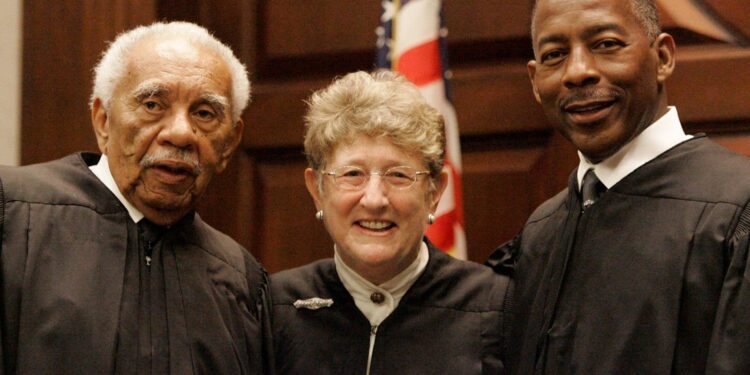Source: The Washington Post
June 05, 2024 Story by: Editor
COLUMBIA, S.C. — South Carolina is transitioning from an all-male Supreme Court to an all-white one.
The state’s General Assembly, which appoints nearly all state judges, unanimously voted 152-0 to promote Court of Appeals Judge Letitia Verdin to the Supreme Court. Verdin, a white woman, will replace Chief Justice Don Beatty, who has reached the mandatory retirement age of 72. Beatty is Black.
Verdin became the sole candidate after two other candidates withdrew, realizing they lacked sufficient support in the 170-seat Legislature. One candidate was a Black woman, and the other was a white man.
“She will be an excellent Supreme Court justice. I’m glad we now have that diversity present,” said Sen. Tameika Isaac Devine, an African American Democrat and Verdin’s law school classmate. “But we shouldn’t trade diversity. We need to take a look across the court system.”
Verdin will be the third woman to serve on the high court. The other two women attended her swearing-in ceremony at the Statehouse on Wednesday.
“I’m a fair judge who believes in serving all persons in South Carolina,” Verdin said in a brief interview following her election.
HISTORY OF DIVERSITY
For the past 17 years, and nearly continuously since 1984, South Carolina has had a Black judge on its highest court. Either a woman or a Black man has served as chief justice for all but one of the past 30 years.
Ernest Finney became South Carolina’s first African American circuit judge since Reconstruction in 1976 and ascended to the state Supreme Court eight years later, marking a significant milestone for Black representation in the judiciary.
“Not only did he do the job excellently, he elevated the reputation of the court system,” said attorney I.S. Leevy Johnson, who was the first Black House member since Reconstruction and later the first Black leader of the South Carolina Bar in the same year Finney joined the Supreme Court. Johnson emphasized that Finney instilled confidence in the legal system among people of color.
Despite this progress, Black representation in South Carolina’s judiciary is dwindling. Just 13% of judges in the trial and appellate courts are Black, in a state where 27% of the population is Black. The state Court of Appeals, a common stepping stone to the Supreme Court, currently has only one Black judge out of nine.
“I never thought we would stop making progress, much less end up going backward,” Johnson said.
LACK OF JUDGES OF COLOR
South Carolina will join 18 other states with all-white high courts, according to the Brennan Center for Justice, which monitors diversity and other judicial issues. Twelve of these states have minority populations exceeding 20%.
Verdin’s election removes South Carolina from another exclusive group: it was the only state Supreme Court without a woman. The previous all-male court upheld a six-week abortion ban last year in a 4-1 decision, with Beatty casting the sole dissenting vote. This ruling followed the retirement of the female justice who authored a prior decision striking down a similar ban.
The court’s new chief justice has pledged to advocate for more diversity, but ultimately, the responsibility lies with the General Assembly, where Republicans hold 118 of the 170 seats.
Republican Rep. Micah Caskey, who is part of the committee that screens judicial candidates, expressed a desire to increase diversity among judges but emphasized that this starts with the candidates themselves. “My perspective is I focus on the best person possible sitting on the bench,” Caskey said.
TILTING CONSERVATIVE
Legislative leaders have voiced concerns over the lack of diversity while also expressing dissatisfaction with recent rulings on abortion, the death penalty, low bonds, and lighter sentences.
Republican House Speaker Murrell Smith stated that this Supreme Court election would result in five “true, bona fide conservatives” on the bench, calling it a significant victory in a call hosted by Americans For Prosperity.
A Democratic former lawmaker has led the state Supreme Court every year but one since 2000.
“So that will be a huge win for us,” Smith said according to the South Carolina Daily Gazette.
DEMEANING SCREENING
Sen. Devine noted that improving diversity in the courts is complex. Some judges of color prefer higher-paying private sector jobs, while others are deterred by the demeaning election process, which includes rigorous background and financial checks and the need to lobby legislators.
“The system needs changing. It seems designed to humiliate people who don’t want to be humiliated,” Devine said.
While Devine supports her friend, Verdin, she acknowledged that many attorneys of color avoid the process, believing it to be fundamentally flawed. “This isn’t about quotas or affirmative action,” Devine said. “This is about real people’s lives in South Carolina and about whether they have a judiciary that is fair and impartial and reflects the diversity of this state.” Source: AP News

















